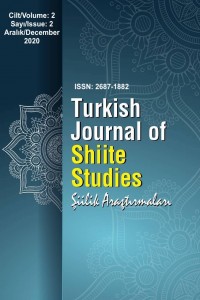Book Review
Veysi Ünverdi, Muʽtazila and Imāmate (The Criticism on Imāmate Theory of Imāmiyya Shīʽa: The Example of al-Qādī Abd al-Jabbār), İstanbul: Endülüs Yayınları, 2020.
Abstract
The issue of imāmate has been one of the main problems among Muslims since the death of the Prophet Muhammad (sav). al-Qādī Abd al-Jabbār said that the imāmate is not related to prophethood. In fact it is a matter of the emirate. But according to “Imāmiyya”, imāmate is the continuation of the prophethood and hence an issue of “belief”. For this purpose, they formed the idea of twelve infallible imams and claimed that all of them were assigned by the nass. al-Qâdî Abd al-Jabbâr rejected such principles of the imāmate. He wrote the twentieth volume of his work titled al-Mughnī specifically about this issue and refused the Imāmiyya. Veysi Unverdi, in his work titled Muʽtazila and Imāmate, studied al-Mughnī and revealed the main points of al-Qādī Abd al-Jabbâr’s explanations about the Imâmiyyah. Apparently, Unverdi applied the method used by al-Qâdī Abd al-Jabbār to his own work. He proved the views attributed by al-Qādī Abd al-Jabbār to Imāmiyya from the basic works of Imāmiyya. Therewithal, he stated the views of the Ahl al-Sunna about the imāmate as well and compared them with the views of al-Qādī Abd al-Jabbār. He concludes that both views are similar. This fact points to an important contradiction. Because, al-Qādī Abd al-Jabbār on the one hand rejected Imāmiyya’s thought of imāmate, but on the other hand to do this, used similar arguments with Ahl al-Sunna, which he also criticized. Additionally, this work of Unverdi is an important work to compare the views of Muʽtazila, Imāmiyya, and Ahl alSunnah on the issue of imāmate in the fields of History of Islamic Sects and Kalām.
Keywords
References
- Ünverdi, Veysi, Mu'tezile ve İmâmet İmâmiyye Şîası'nın İmâmet Anlayışının Eleştirisi: Kâdî Abdülcebbâr, İstanbul, Endülüs Yayınları, 2020.
- Kâdî Abdülcebbâr. Şerhu’l-Usûli’l-Hamse: Muʽtezile’nin Beş İlkesi. çev. İlyas Çelebi. İstanbul: Yazma Eserler Kurumu Başkanlığı, 2013.
Veysi Ünverdi, Muʽtezile ve İmâmet (İmâmiyye Şîası’nın İmâmet Anlayışının Eleştirisi: Kâdî Abdülcebbâr Örneği), İstanbul: Endülüs Yayınları, 2020.
Abstract
İmâmet meselesi, Hz. Peygamber vefat ettiği ilk andan itibaren Müslümanlar arasında bir problem haline gelmiştir. Kâdî Abdülcebbâr, imâmetin Peygamberlik görevi ile değil emirlik müessesi ile aynı kategoride olduğunu söylemiştir. İmâmiyye ise imâmeti peygamberliğin uzantısı olarak görmüş ve bir inanç meselesi haline getirmiştir. Bu doğrultuda nass ve tayin yolu ile göreve geldiğine inandığı on iki masum imam inancını geliştirmiştir. Kâdî Abdülcebbâr, onların imâmet prensibine karşı çıkarak el-Muğnî adlı eserinin yirminci cildini imâmet meselesine has kılmış ve İmâmiyye’ye reddiye olacak şekilde kaleme almıştır. Veysi Ünverdi de Muʽtezile ve İmâmet adlı eserinde el-Muğnî adlı eserini dikkate alarak Kâdî Abdülcebbâr’ın İmâmiyye’yi imâmet meselesinde eleştirdiği noktaları ortaya koymaya çalışmıştır. Ünverdi, Kâdî Abdülcebbâr’ın eserinde takip ettiği metodu kendi eserine uygulamıştır. Ayrıca Kâdî Abdülcebbâr’ın İmâmiyye’ye atfettiği görüşleri İmâmiyye’nin kendi temel kaynaklarından delillendirmiştir. Bununla beraber Ehl-i Sünnet’in imâmet ile ilgili görüşlerini de vererek Kâdî Abdülcebbâr’ın Ehl-i Sünnet ile benzer olan fikirlerini tespit etmiştir. Sonuç olarak Kâdî Abdülcebbâr, İmâmiyye’yi imâmet meselesinde reddetmekle birlikte onları eleştirdiği birçok noktada Ehl-i Sünnet ile benzer bir görüş ortaya koymuştur. Ünverdi’nin bu eseri de İslam Mezhepleri Tarihi ve Kelâm alanlarında Muʽtezile, İmâmiyye ve Ehl-i Sünnet’in imâmet meselesi hakkındaki görüşlerini mukayese etmek adına önemli bir boşluğu doldurmuştur.
Keywords
References
- Ünverdi, Veysi, Mu'tezile ve İmâmet İmâmiyye Şîası'nın İmâmet Anlayışının Eleştirisi: Kâdî Abdülcebbâr, İstanbul, Endülüs Yayınları, 2020.
- Kâdî Abdülcebbâr. Şerhu’l-Usûli’l-Hamse: Muʽtezile’nin Beş İlkesi. çev. İlyas Çelebi. İstanbul: Yazma Eserler Kurumu Başkanlığı, 2013.
There are 2 citations in total.
Details
| Primary Language | Turkish |
|---|---|
| Subjects | Religious Studies |
| Journal Section | Book Review |
| Authors | |
| Publication Date | December 31, 2020 |
| Submission Date | December 20, 2020 |
| Acceptance Date | December 22, 2020 |
| Published in Issue | Year 2020 Volume: 2 Issue: 2 |


